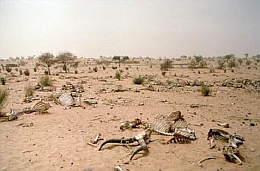Climate Change: Africa Clamours for Reparations

 |
| Effects of Drought Photo Courtesy |
Although Africa is least responsible for global warming, it is however suffering from the impacts of climate change.Africa suffers most from the problem that it has not created! Given that Africa is already suffering from the severe effects of climate change, we all must urgently seek solutions.
The international community is already engaged in a protracted process that will hopefully lead to an ambitious and effective international agreement to combat climate change at
Due to the great importance that the African Union attaches to the issue of climate change, the Heads of State and Government have recently taken important decisions on climate change. The 12th Ordinary Session of the African Union Assembly of Heads of State and Government held in Addis Ababa,
a) That the global carbon trading mechanisms that are expected to emerge from international negotiations on climate change should give Africa an opportunity to demand and get compensation for the damage to its economy caused by global warming and underlines in this regard the fact that despite contributing virtually nothing to global warming Africa has been one of the primary victims of its consequences.
b) That Africa needs to be represented by one delegation, which is empowered to negotiate on behalf of all Member States, with the mandate to ensure that resource flow to Africa is not reduced. The AU Commission was mandated to work out modalities of such representation.
The 13th Ordinary Session of African Union Assembly of Heads of State and Government held in Sirte, Libya established the Conference of African Heads of State and Government on Climate Change (CAHOSCC) comprising of the Chairperson of the African Union; the Federal Democratic Republic of Ethiopia the Republics of Algeria; Congo; Kenya; Mauritius; Mozambique; Nigeria and Uganda. Others include the Chairpersons of the African Ministerial Conference on Environment; the African Union Commission; and technical negotiators on climate change from Member states.
CAHOSCC and all AU Ambassadors and African negotiators from member States attending the negotiation process towards the 15th Conference of Parties (COP 15) were mandated to make use of the approved African common position on climate change.
The mentioned decisions signify a fundamental shift in the collective policy and practice of African States towards international negotiations on climate change. Not only do they articulate a key political message that should inform the content of Africa’s common position on key climate change agenda items that are under negotiation but also Africa will henceforth be represented by one delegation at international meetings on climate change. CAHOSCC will spearhead
By Dr. Jean Ping
Chairperson, Africa Union Commission.
